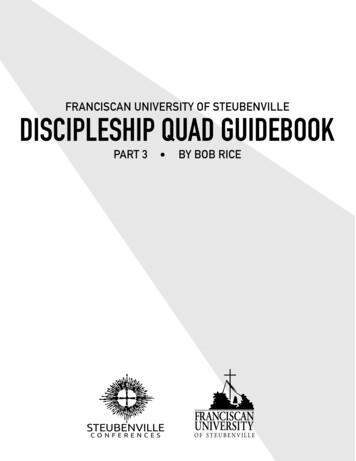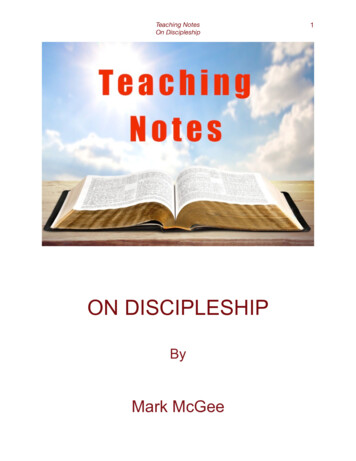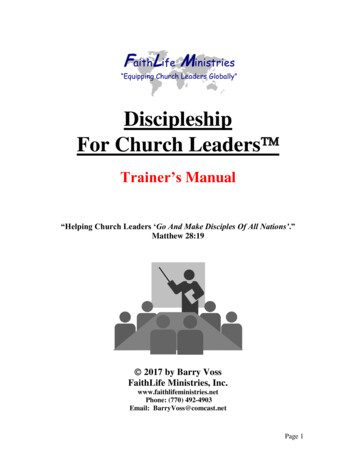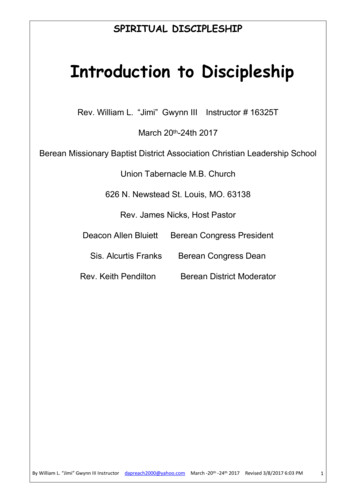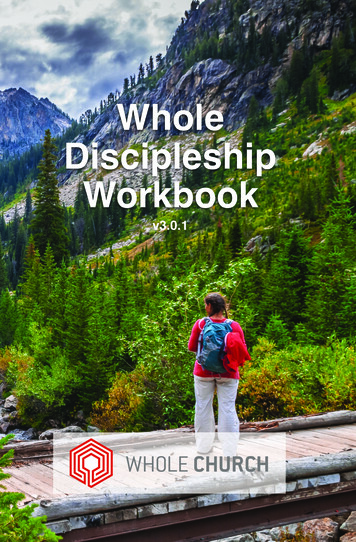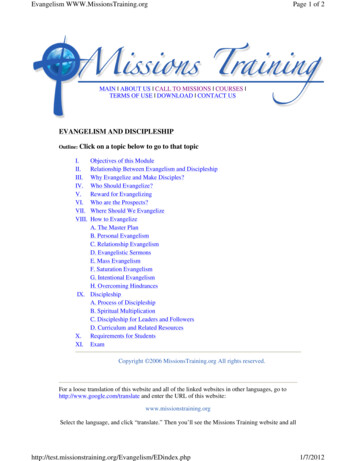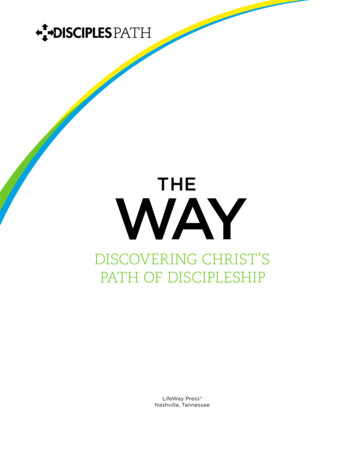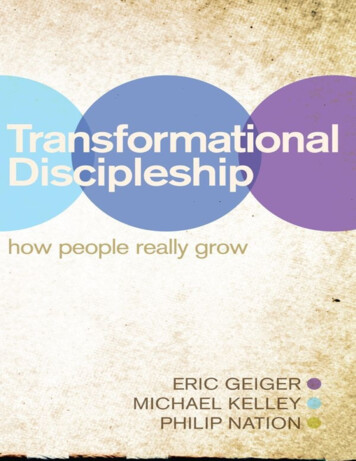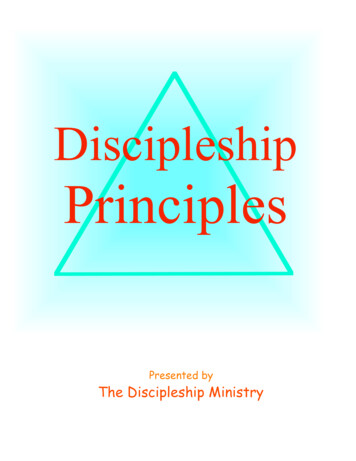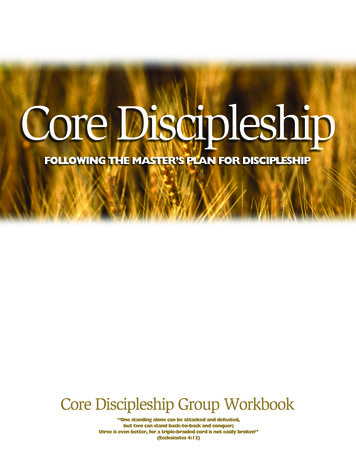
Transcription
CORE Discipleship is a faith-based, Christian organization. Our mission is to help you make disciples of Jesus. We provide a simple and reproducible discipleship process based on Jesus’ “innercircle” or “core” comprised of Peter, James, and John. We also provide discipleship training andfree discipleship resources as free downloadable eBooks.Just like you, Father God is using the many events and circumstances of life’s journey to moldand shape me into the person He desires. Occasionally, I’ve cooperated completely. It’s in thoserare moments when something extraordinary takes place - Heaven touches earth, mountains aremoved, a part of me is transformed.Through His infinite patience and unfathomable love I am learning to become the man He createdme to be. As I daily surrender my life to Him through His precious Holy Spirit, I see more clearlylife eternal.My hope and prayer for you are that you too will discover God’s purpose and become exactly whatHe has planned for you all along - His son or daughter.May God grant that we become His disciples by His grace,Doug MorrellWe charge absolutely nothing for our resources. We do require that you use the content in a non-commercial manner in an effort to “lead people to become fully devoted followers of Christ.” In other words, youare not allowed to use our resources and charge people for them. We’re not interested in our name or brandon the resources. We would love to hear back from you. Let us know how our resources are helping peoplegrow in Christ. God bless you as you live His life.Doug is a seasoned discipler and small group leader. Since graduating from Texas Tech University in 1984,he’s worked in a dual capacity -- working within for-profit businesses around the country while also servingthe church in various pastoral roles. Additionally, he and his wife Suzie are the founders/directors of COREDiscipleship, a ministry dedicated to making disciples who make disciples. Doug and Suzie have three children: Katheryn, Hannah, and Nathaniel.Published by: CoreDiscipleship.comScripture taken from the Holy Bible, New International Version. Copyright 1973, 1978, 1984 International Bible Society.Used by permission of Zondervan Bible Publishers. Other Scripture quotations in this publication are from the KingJames Version (KJV). Public domain. Scripture taken from THE MESSAGE. Copyright by Eugene H. Peterson, 1993,1994, 1995. Used by permission of NavPress Publishing Group.Page 2. 2003 Doug Morrell Core Discipleship Workbook CoreDiscipleship.com
Foreword“One standing alone can be attacked and defeated, but two can stand back-to-back and conquer;three is even better, for a triple-braided cord is not easily broken” (Ecclesiastes 4:12 TLB).As evangelical Bible-based followers of Christ, we have tended to embrace the theology of the NewTestament, while ignoring many of the patterns of structure for the Church. While good theologyis absolutely essential, there are many hidden jewels in the patterns of Christ and the early churchthat allow for a more effective ministry. One of those patterns of Christ is crowd-twelve-three. Jesus ministered to the crowd, discipled the twelve, and closely trained the three (Peter, James, andJohn).In the terms of this book,we are called to celebration-small group-core. As I look around, I seechurches that excel in one or two of these areas. But, imagine a church that is intentionally investing simultaneously in each of these areas.Imagine a church that knows how to gather a crowd. They produce an excitement for what God isdoing corporately. They provide a way for a celebration that comes from the heart.Imagine a church with a strong small group network. The Kingdom of God is moving forwardthroughout the week building relationships and being involved in one another’s lives.Imagine a church sprinkled with CORE Groups. Men and women growing deeper in their faith andbeing challenged to new levels of commitment, evangelism and discipleship.Now, imagine these three strands intertwined in the same local church. In my opinion, that is achurch that cannot be stopped. The “three-strand” church is a world-changing church.While there has been volumes of books written on corporate worship and small group ministry,comparatively very little has been put in print regarding CORE Groups. Doug Morrell fills in thegap with the CORE Group Manual. It is a “hands on” book that will allow the third missing strandof the church to gain much needed momentum.Use this book as a field guide, not a theology textbook. Commit yourself to be a doer of the wordand never look back.Make way for the “three-strand” church!Phillip HearnFounding Senior PastorNew River FellowshipHudson Oaks, Texas 2003 Doug Morrell Core Discipleship Workbooks CoreDiscipleship.comPage 3
This Manual belongs to:Address:City/State/Zip:Phone:Email:My discipler:This guide was started on:This guide was completed on:Recommended Process/Timeline (12-52 weeks*):1. Overview. 10 weeks. Developing life-long relationships/process. Community/preservation2. Ephesians. 6 weeks. Your position and practice in Christ Jesus. Eph. 3x; disciplines of unity3. Your Testimony. 1 week. Clearly writing and communicating your story. Empowers; confidence4. Galatians. 6 weeks. Salvation by faith alone; being Spirit led. Gal. 3x; being Spirit led5. Sharing the Gospel. 1 week. Steps in leading someone to Jesus. Evangelism6. Philippians. 4 weeks. Rejoicing in all circumstances; joy. Phil. 3x; unity7. Colossians. 4 weeks. The Lordship of Jesus; wisdom. Col. 3x; Jesus’ Lordship8. John. 10 weeks. Knowing God by believing In Jesus. John 3x; the Gospel account9. James. 5 weeks. Applying your faith. James 3x; faith that works10. 2nd Timothy. 4 weeks. Committed to ministry. 2nd Tim. 3x; suffering*Depending upon the spiritual maturity of the CORE Group members (see page 33 for Church FastTrack use).Page 4. 2003 Doug Morrell Core Discipleship Workbook CoreDiscipleship.com
Core DiscipleshipTable Of ContentsIntroduction.6Overview.9How To use This Guide. 10Lesson 1: Jesus’ Pattern For Discipleship.13Lesson 2: CORE Group Overview.22 Church FastTrack.23 CORE Covenant.35Lesson 3: Launching Your CORE Group.37Lesson 4: Spiritual Life Stages.43Lesson 5: How To Improve Your Serve.65Lesson 6: The Great Commandment. 71Lesson 7: The Great Commission.73Lesson 8: Four Keys Of CORE Groups.75Lesson 9: The Work Of Ministry.77Lesson 10: The Pattern Of Discipleship.79 Being Spirit-Led.80 Studying God’s Word. 81 Praying.82Lesson 11-16: Ephesians Study.85Lesson 17: Writing Your Testimony.97Lesson 18-23: Galatians Study. 107Lesson 24: Learning To Share The Gospel. 119Lesson 25-28: Philippians Study. 127Lesson 29-32: Colossians Study. 135Lesson 33-42: John Study. 143Lesson 43-47: James Study. 163Lesson 48-51: 2 Timothy Study. 173CORE Forms. 180Addendums: Spirit Empowered Discipleship. 186 Pastor’s Section: Three Strand Church. 188Topical Training (Scriptures). 190WrapUp: Whatever It Takes. 192 2003 Doug Morrell Core Discipleship Workbooks CoreDiscipleship.comPage 5
IntroductionDiscipleship Is A Process.Not A ProgramOften times, in our zeal to teach God’s Word, we exchange programsfor process; we give fish instead of teaching others to become fishersof men. In the larger sense, we are raising up a generation not capableof discipling the next generation. Based on the Great Commission, theApostle Paul established a pattern for the preservation and transmissionof the gospel. Teaching is to be passed on to successive generationswithout addition or alteration.“And the things you have heard me say in the presence of many witnesses entrust to reliable menwho will also be qualified to teach others.” (2 Tim. 2:2)Discipleship Is Spiritual ParentingDiscipleship is like raising children; to instill God’s truth, it should be relational and intentional. Itembraces two precepts: We can do more together than we can ever do by ourselves. And, the moreeffective those you join with, the more effective your growth will be.“Two are better than one, because they have a good return for their work: If one falls down, hisfriend can help him up. But pity the man who falls and has no one to help him up! Also, if twolie down together, they will keep warm. But how can one keep warm alone? Though one may beoverpowered, two can defend themselves. A cord of three strands is not quickly broken.” (Eccl.4:9-12)“Do not be misled: “Bad company corrupts good character.” (1 Cor. 15:33)”He who walks with the wise grows wise, but a companion of fools suffers harm.” (Prov. 13:20)A disciplemaker, spiritual parent, mentor or coach is a person whom you intentionally enter into apersonal relationship with and who can help you grow in every area of your life (spiritually, emotionally, intellectually, physically, etc.). It is someone who:a. Will encourage you. We tend to become what the most important person in our lives thinks we’llbecome. Great instructors/coaches are those who bring out the best in us. They are great encouragers.b. Will confront you. Proverbs 27:5, 6 says, “Open rebuke is better than secret love. Faithful are thewounds of a friend; but the kisses of an enemy are deceitful.” It is someone who knows that confrontation develops a person and that criticism destroys a person. It is someone who knows that tocritique is to criticize. He or she will hold you accountable while demonstrating a spirit of mutualsubmission. A discipler is a person in your life who will ask you the hard questions. They know thepoint is always restoration and work to that end. Disciplers are trustworthy.c. Will intercede for you. A mentor is bold in their witness but humble in their relationships withothers. They act as a bridge between God and those they are praying for and are bonded togetherwith those they are discipling/parenting.Page 6. 2003 Doug Morrell Core Discipleship Workbook CoreDiscipleship.com
d. Will be your lifelong partner. They are there to help you lift theload. One draft horse can pull two tons; two draft horses can pull23 tons. There is power in numbers.Like parenting, discipleship a lifelong process.“.the Bible - God’s inerrant,infallible Word - is central tothe CORE Group, followedonly by fellowship, communion, and prayer. All four arekey aspects of the early churchand paramount to the COREGroup process and success.”To illustrate, if Jesus had spent only 12 hours a day with His menfor three years that would be 4,380 hours a year or at least 13,140hours over that three-plus-year period. In comparison, if today’s pastor were able to spend one hour each day with just one person hewould have invested 365 hours in one year. At that rate it would take 36 years to match the numberof hours Jesus invested with the 12. Based on the CORE process, one year is not an unreasonableamount of time to invest into the life of a few who can be trained, supervised, and released to thenrepeat the process.Current Discipleship Trends - How Are We Doing?According to noted Christian researcher George Barna, the Christian Church in America is comprisedof “many converts, but shockingly few disciples.” This conclusion is based upon two years of researchBarna conducted regarding the current state of discipleship. His findings included the following: When Christian adults were asked to identify their most important goal for their life, not a singleperson said it was to be a committed follower of Jesus Christ, or to make disciples of Christ. Less than one out of every five born again adults had any specific and measurable goals relatedto their personal spiritual development. Less than 1% of all believers perceived a connection between their efforts to worship God andtheir development as a disciple of Jesus. The most widely-known Bible verse among adult and teen believers is “God helps those whohelp themselves” - which is not in the Bible, and actually conflicts with the basic heart of Scripture. A minority of adult and teen believers contends that absolute moral truth exists. Less than one out of every ten believers possess a biblical world view as the basis for his/herdecision-making or behavior. When given thirteen basic teachings from the Bible, only 1% of adult believers firmly embracedall 13 as being biblical perspectives. Research revealed specific and significant problems related to core spiritual practices such asworship, evangelism, stewardship, community service, and life-styles.Barna also noted that most believers stated that their church does little to help them grow as a truedisciple. “Few believers said that their church lacked programs, but most Christians complained that 2003 Doug Morrell Core Discipleship Workbooks CoreDiscipleship.comPage 7
little is done to effectively motivate and facilitate their development as genuine, fervent followers ofChrist. Our surveys among pastors showed that they dismissed such views as excuses and as inaccurate, but the bottom line remains unchanged: most Christians are simply not making progress intheir personal spiritual development.”I want to say at the outset that there’s no such thing as “the perfect discipleship model.” There are,however, several principles that will help us understand what Jesus did so that we can attempt tobuild according to His pattern.Jesus chose men. He knew the quality of their lives. He walked with them. He scrutinized their lives.He spent a night in prayer before making His selection. And then He chose. What we learn is thatGod establishes men and women - men and women who are surrendered to Him and controlled byHis Holy Spirit.Jesus knew those men. He chose them from all others because He saw them not in terms of whatthey were, but what they would become as He invested His life in them. They were men with openhearts and minds. Most likely, they were hungry for the wrong things, but He kindled their passioninto a burning desire for Him. He chose them because they hungered and thirsted after righteousness.He said, “Follow me, and I will make you fishers of men.”In the same way, Jesus tells us, “Go therefore and make disciples of all nations, baptizing them Inthe name of the Father and of the Son and of the Holy Spirit, teaching them to obey everything I havecommanded you.”We are to “make disciples.” The other action verbs are all subordinate to this main idea to make disciples. Literally, Jesus tells us, “Having gone, make disciples by baptizing and by teaching.” He tellsus what is involved in making disciples. The main idea is to make disciples, not friends for Jesus, notfans, not to develop a large following, because Jesus says there will never be many who will follow.To follow Jesus involves a cross - His Passion - and a cross means the laying down of our own goalsand purposes, hopes and dreams, the things for which we live, and settling once and for all that JesusChrist is Lord of our lives, and that we are going to serve Him.There will never be many who will make that kind of decision. The Lord always drew the lines hardand fast and He said that there would be very few that would cross over. And when they did, He wouldhit them immediately with his claim as Lord, “Are you willing to follow me, and yield everything?”If you are using this guide, you are already demonstrating a hunger for righteousness. As such, youare to present Christ, and then to stay with those you train and prepare them until they themselvesare independently dependent on the Lord and able to go on, released to repeat the same process.May God grant that we become disciples by His grace,Doug MorrellPage 8. 2003 Doug Morrell Core Discipleship Workbook CoreDiscipleship.com
OverviewJesus gave us these three characteristics of a disciple:1. Obedient to God’s Word: “If you continue in my word, you are truly my disciple.” (John 8:31);2. Loving: “By this all men will know that you are my disciples if you have love for one another.”(John 13:35);3. Fruitful: “By this my Father is glorified, that you bear much fruit and so prove to be my disciple.”(John 15:8).If you are this kind of person, then it is your job, whether as an electrician, lawyer, student or housewife, to make disciples. Regardless where you are or by what means you earn your living, God hasgiven you a platform for making disciples. You simply need to take the next step in faith and you willthen discover you have your entire lifetime to work out the exciting details of this adventure calleddiscipleship.Additionally, these same three characteristics are what you should look for in those you prayerfullyconsider and choose as members of your CORE Group.No one has to be a theologian or pastor to see incredible fruit. Immediately, you’ll begin seeing yourCORE Group develop in ways resembling the early church.What is a disciple, anyway? A Biblical disciple is a Christ-believer in process - someone who is movingtoward maturity. The process of discipleship begins at the moment a person receives Jesus as Lordand Master of their life and continues as long as he or she keeps learning and growing. Salvation isa free gift; everything else is going to cost us something. Our war is against the flesh, not so muchour enemy. We begin the journey as a baby and others should not expect a baby to act like a maturesaint. Growth, just like in the natural, has various stages. There are all kinds of starts, false starts,victories and defeats. But there should always be growth.As you’ll notice, the Bible - God’s inerrant, infallible Word and being Holy Spirit-led - are central tothe CORE Group, followed only by fellowship, communion, and prayer. All four are key aspects ofthe early church and paramount to the CORE Group process and success.By using the CORE Guide as a “roadmap” - from just one CORE group - you will have invested morethan 80-hours together as a group, thoroughly read and digested seven books of the Bible, maintaineda year-long journal with notes, memorized over 50 key scriptures, written and used your testimony,learned to discern various levels of spiritually maturity, learned to effectively present the Gospel,read through the Book of Proverbs 12 times (highly recommended, but optional), read through suchdevotionals as “Practicing His Presence”, “My Utmost For His Highest”, or “A Testament Of Devotion”(as presented by the CORE leader and as an option), prayed for and evangelized eight converts andbegan discipling four new disciples, established life-long relationships, will have launched at leastone other CORE Group with three more CORE Groups soon to follow. All in one year . now that’sthe Power of One - Give God the glory! 2003 Doug Morrell Core Discipleship Workbooks CoreDiscipleship.comPage 9
How To Use This GuideThis guide is designed for Core Groups and is a training manual for Core Group leaders and members.Those who have experienced the fellowship found in small groups will find that many of the samedynamics can be used in the CORE, but greater emphasis is placed on God’s Word and deeper degreesof relationship - relationships that will last long beyond the Group’s time together.If you’re not familiar with small groups, one excellent resource on small group life is David Finnell’sfine work entitled “Life In His Body” (available from Touch Publications, Houston, Texas).1. Each section begins with a CORE Group Guide (Lesson 1 on the opposite page is the outline for theGroup’s first meeting). Each person needs to review and complete the Lesson prior to the next meeting.During the group meeting, you can use the discussion and accountability questions as a guideline.2. Depending upon the spiritual maturity level of each member, the CORE process can be imparted inas little as 3 months or in 12 months. Some of the members in your CORE Group will have tremendousunderstanding of God’s Word, having walked with Him for years, and simply need to understandthe process. Others will be new believers, or those needing to see the big picture and these will takemore time to establish foundations. This Manual is a tool. As the CORE leader and discipler, youare free to choose and recommend additional optional reading, to choose how much time is necessary to ensure spiritual maturity, and to lead others into a deeper fullness and understanding of theprinciples of the Great Commandment and Great Commission. Be Spirit-led and don’t simply use thetool as a lecturing resource.3. The CORE purpose is to fulfill the Great Commandment and the Great Commission using the 4 keysfound in Acts 2:42, the enterprise outlined in Ephesians 4:11-13, and the pattern found in 2 Timothy2:2. These five major Scripture passages form the “hand-shake” of Core Groups.4. Try and keep each meeting time from 60-90 minutes in length; the majority of your time will bespent in God’s Word, fellowship, communion, and prayer. Build lasting relationships.5. A disciple is someone who is in the process of learning to observes all that Jesus commanded.Likewise, to ensure the preservation and transmission of the CORE Group process, CORE Groupsshould be born from CORE Groups.Additionally, the first lessons are purposely designed to build a foundation for the CORE Groups andwill help you understand and present the biblical basis for discipleship, how the CORE Groups canbe integrated as a “third strand” into existing or new church discipleship processes, provides an introduction to spiritual life stages, contains a spiritual life stage assessment tool, lays the groundworkfor the CORE, and contains an overview and reminder of effective communications for the CORE. Itis both academic and vocational. Every lesson, meeting, and relationship is an opportunity to knowGod and make Him known.Let’s get started!Page 10. 2003 Doug Morrell Core Discipleship Workbook CoreDiscipleship.com
Journal & Notes: 2003 Doug Morrell Core Discipleship Workbooks CoreDiscipleship.comPage 11
Lesson Notes/Prayer Requests:ACCOUNTABILITY: Ask These questions of each other during your time together and during the week.USING A SCALE FROM 1-5 (1 VERY LITTLE, 5 VERY MUCH), THIS WEEK I HAVE PURPOSELY FOCUSED ON:Being empowered by the Holy Spirit - daily, moment-by-moment, I’m learning to walk in the Spirit.My commitment to the Great Commandment - I am blameless before God and there are no known offenses in my life.My commitment to the Great Commission - I am bringing others to Christ and discipling others in Christ.My commitment to Spiritual Disciplines: each day I am in God’s Word, prayer, praise, confession, and meditation.My commitment to my Local Church & Church Authority - this week I served a ministry within my church/tithed.My commitment to Personal Ministry - this week, I served in a ministry outside the church.My commitment to Godly Stewardship - this week, my life, talents, gifts, and money were used for God’s Kingdom.My commitment to living a Quiet Life - I am not caught up in the busyness of this world - I am at peace.My commitment to living in Holiness - I have not been involved in anything that would bring harm to Jesus’ name.Page 12. 2003 Doug Morrell Core Discipleship Workbook CoreDiscipleship.com
CORE GuideLesson 1: Jesus’ Pattern For DiscipleshipDate:Completed?YesNoAssignmentsLesson NotesRead the Core Group Manual (pages 14-19); read John 8:31;John 13:35; John 15:8 (read through each chapter for context)Bible StudyPrayerfully consider each of these passages and be prepared toreview each in your meeting time.*Optional Reading* Read a Proverb each day corresponding with the day’s date* Read today’s devotional such as Utmost For His HighestOutreach Pray for two people whom you can win to Christ and trainto win another. Pray for one person whom you can begin discipling.Scripture Memory John 13:35From these 3 passages, what 3 criteria mark Jesus’ disciples?How do you abide in God’s Word?What is a disciple?Who are to be Jesus’ disciples? Who is commanded by Jesus to make disciples?What two promises can be claimed by Jesus’ disciples?What kind of fruit are disciples to bear?I am praying thatwill become a disciple. 2003 Doug Morrell Core Discipleship Workbooks CoreDiscipleship.comPage 13
Lesson 1: Jesus’ Pattern For DiscipleshipJesus ministered to the multitudes at least 17 times according to theBible. At times His ministry was conducted one-on-twelve. He alsoprovided on-the-job training with the 70; and spent some apprenticeship time with the 120 as well as placing some emphasis with the 500in Galilee. However, there are approximately 46 mentions in the Biblewhere He spent His time in private with His disciples. In those smaller“inner-group” settings He trained His committed followers fortheir own ministries. He ministered one-on-one, one-on-two,and one-on-three.In his book, “The Holy Spirit”, Billy Graham statesthe following as being vital to the biblical process ofestablishing new believers in their faith:Notes:Page 14“One of the first verses of Scripture that DawsonTrotman, founder of The Navigators, made mememorize was, “The things that thou hast heard of meamong many witnesses, the same commit thou to faithful men, whoshall be able to teach others also” (2 Tim. 2:2 KJV). This is a littlelike a mathematical formula for spreading the gospel and enlargingthe Church. Paul taught Timothy. Timothy shared what he knewwith faithful men; these faithful men would then teach others also.And so the process goes on and on. If every believer followed thispattern, the Church would reach the entire world with the gospelin one generation. Mass crusades, in which I believe and to whichI have committed my life, will never finish the Great Commission;but a one-by-one ministry will.”The great commission has two parts. The first is for us to go and makedisciples. The second is of no less significance, but is often times setaside to secondary importance if used at all. It is to teach people (apprentice disciples) to obey. There cannot be a disciple without thistraining. And there cannot be training without accountability. Theprimary objective of the believer today as outlined by Jesus is fordisciples of Jesus to develop other men and women into disciples.We must understand that God is never concerned about the size of agroup. Size has nothing to do with success. Success is always basedon a relationship that produces lasting fruit.“Go therefore and make disciples of all nations, baptizing themIn the name of the Father and of the Son and of the Holy Spirit.”(Matthew 28:19,20)The Great Commission maintains one imperative and that is to “makedisciples.” The other action verbs are all subordinate to this main ideato make disciples. Jesus tells us, “Having gone, make disciples by. 2003 Doug Morrell Core Discipleship Workbook CoreDiscipleship.com
baptizing and by teaching.”What follows is an overview of the current discipleship process foundin many churches today with one major addition. This one additioncan greatly enhance your discipleship efforts, increase the depth andquality of leadership, and provides a safe and caring environment forthose to whom you are discipling. This biblical process provides for theestablishment of new converts in the faith, the equipping (preparing,repairing, repentance, restitution, restoration, restoring to Kingdomdynamics, and releasing) of disciples for ministry, the enlistment of allto follow Jesus’ plan for discipleshi
Page 2 2003 Doug Morrell Core Discipleship Workbook CoreDiscipleship.com CORE Discipleship is a faith-based, Christian organization. Our mission is to help you make dis-ciples of Jesus. We provide a simple and reproducible discipleship process based on Jesus’ “inn
